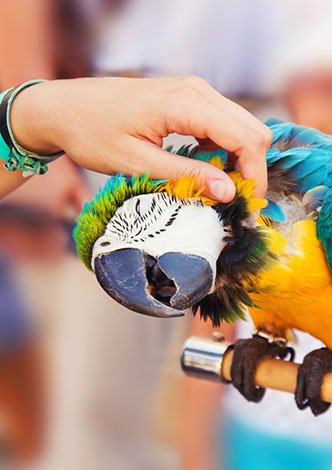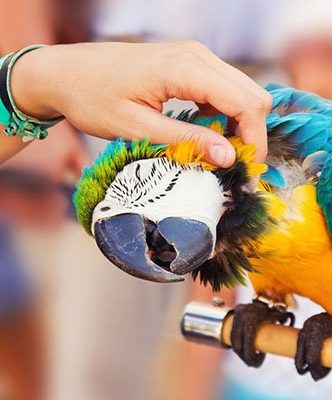
When you dive into training, you might find yourself focusing on three key areas: teaching your macaw to step up, master recall, and learn some fun tricks. Imagine your macaw as a small, colorful sponge soaking up everything you teach. With each trick and command, you’re building a bridge of trust and communication between you two. So grab your favorite snack (for both of you) and let’s get started!
Understanding Your Macaw’s Behavior
Before jumping into training techniques, it’s important to understand your macaw’s behavior and temperament. Macaws are incredibly social and intelligent creatures. They form strong bonds with their owners, which can be a double-edged sword. You want to teach them effectively while making sure they feel secure and happy.
You might be surprised to learn that macaws often communicate through body language. For example, if your macaw is fluffing its feathers or making soft vocalizations, it might be feeling relaxed and open to learning. On the other hand, if its feathers are ruffled and it’s hissing, it’s best to back off for a bit. Training sessions should feel like positive interactions, not stressful experiences.
Here’s the thing: Pay attention to your macaw’s mood. A well-fed, rested, and engaged macaw will be far more receptive to training. Try to schedule training during the times when your bird seems the most energetic and alert. Understanding these basic behavioral cues will set you up for training success.
Step-Up Training: The Foundation of Trust
Step-up training is one of the most fundamental commands you can teach your macaw. This command creates a foundation of trust and communication between you and your bird. Think of it as the first step in a dance partnership—you both need to be in sync.
To start, find a quiet space without distractions. Offer your finger or a perch and say “step up” in a cheerful tone. If your macaw steps on your hand, praise it with enthusiasm and perhaps even a small treat. Remember, positive reinforcement is key!
If your macaw hesitates, don’t push it. Instead, gently coax it by wiggling your finger within reach. Be patient; some macaws may take a bit longer to trust. If it seems nervous, try using a favorite toy to help it connect the command with something fun. Over time, your macaw will associate the command with positive experiences, making stepping up a breeze.
Recall Training: Bringing Your Bird Home
Once your macaw is comfortable with the step-up command, recall training is a natural next step. This is all about getting your macaw to come to you when called. It’s like teaching a dog to fetch but with a charming twist—your macaw might even add a little flourish on the way!
Start by selecting a short, distinct word or phrase, like “come here” or “birdie, come!” Use this consistently during training. Begin close to your macaw and let it perch on your arm or shoulder. Then, gently encourage it to fly back to you using the command.
Using treats as motivation can make this process a lot more fun. If your macaw flies to you, celebrate with lots of verbal praise (think of a cheerleading squad), and give it a treat. If it doesn’t fly back right away, you can even take a few steps back to encourage it. Just remember, practice makes perfect!
Teaching Tricks: Fun Ways to Bond
Once your macaw has a solid foundation with step-up and recall, it’s time to have some fun with tricks! Think of these as charming party tricks that not only entertain but also strengthen your bond. Plus, showing off to friends can be a blast!
Start with simple tricks like “wave” or “spin.” For waving, hold a treat just above your macaw’s head. When it raises its foot to grab the treat, gently encourage it to keep lifting that foot by saying “wave.” As it learns, gradually reduce the treats and increase your praise.
As you progress, you might find that your macaw enjoys the challenge of learning new tricks. Mix it up and keep the sessions short; around 5 to 10 minutes is ideal. If your bird is having fun, it will be much more engaged and likely to learn faster. Plus, you’ll both look forward to these training times together!
Common Challenges: Troubleshooting Your Training Sessions
Even with the best intentions, training can hit some bumps along the way. You might notice that your macaw isn’t responding to commands as you expect. This is perfectly normal!
Sometimes, your macaw might get distracted by its surroundings. If this happens, try training in a quieter space. Also, consider timing—if your macaw just woke up or hasn’t had enough interaction, it may not be in the right mindset for training.
Another common challenge is resistance. If your macaw refuses to step up or come when called, revisit the basics. Are you using positive reinforcement consistently? Are your commands clear? It might help to break down the tasks into smaller, more manageable steps.
Finally, don’t forget to celebrate progress, even if it’s small. Every little step forward is worth recognizing.
Maintaining Consistency and Patience
As with any training endeavor, consistency and patience are crucial. Birds, like people, can have off days. Some days your macaw might be eager to learn, while others it might just want to hang out.
Make training a regular part of your routine. Short daily sessions are far better than infrequent long ones. It keeps your macaw engaged and looking forward to these moments together.
Also, keep your commands and cues consistent. If you change the wording or tone suddenly, it might confuse your macaw. Stick with what works and be patient as it learns. Remember, the goal is to build trust and connection over time.
Training your macaw isn’t just about teaching commands; it’s about building a relationship. Each session is an opportunity for you both to learn and grow. As you teach your macaw to step up, recall, and perform tricks, you’re cultivating a deeper bond that enriches both your lives.
So, keep things fun and rewarding. Celebrate the little victories along the way, and don’t get discouraged by the hiccups. With love, patience, and a sprinkle of creativity, you’ll turn your macaw into a charming companion that delights you with its newfound skills. Happy training!

